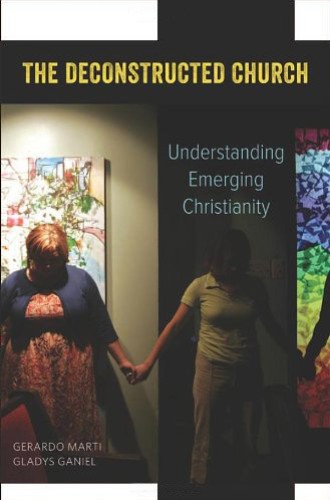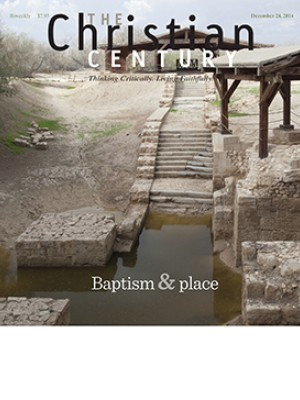The Deconstructed Church, by Gerardo Marti and Gladys Ganiel
In The Deconstructed Church, two veteran sociologists of religion give us our most extensive, comprehensive, and revealing ethnographic study of the worldwide phenomenon known as the emerging Christian movement, or as they abbreviate it, the ECM. Though so-called emerging Christians despise definitions and generalizations about themselves, the authors begin with a helpful definition: “The ECM is a creative, entrepreneurial religious movement that strives to achieve social legitimacy and spiritual vitality by actively disassociating from its roots in conservative, evangelical Christianity.”
Through participant observation, focus groups, in-depth interviews, surveys, and reading in the burgeoning literature of the emerging Christian movement, Gerardo Marti and Gladys Ganiel studied the worldwide network of thousands of emerging congregations and their participants (emerging Christians don’t like to be called members of congregations—sounds too boringly institutional). Though ECM congregations do not yet account for a significant segment of Christianity, they may be the most fascinating, fresh development in the church in our time and our area of Christendom.
Read our latest issue or browse back issues.
The key lens through which Marti and Ganiel view the emerging Christian movement is that of deconstruction. While there is much diversity, one thing unites: a conviction—in a movement suspicious of convictions—that the church in its big, mainline, evangelical, and Roman Catholic forms is not right. Emerging Christians are living out Jacques Derrida’s comment that “Christianity is the only mad religion” and that it “survives by deconstructing itself.”
The ECM is mostly a movement that defines itself against the way that many of us have done church, but a few mainline denominations are attempting to integrate some of the movement into themselves. I am the pastor of a traditional, aging United Methodist congregation that, with my encouragement, has just invited a hip ECM congregation into our building to do their Sunday evening Eucharist-on-sofas, candles, and jazz thing. I hope we catch some of what they’ve got.
In many ways, this is a very hopeful book. I, who often lament the stolid, ossified nature of my own church, found it an invigorating reminder that the church can be one of the most adaptive, supple institutions in history in its fluid, deconstructing, reconstructing inventiveness. And yet this book is also a bit scary to a bishop like me who was produced by and has spent my life serving the church that the ECM means to deconstruct.
The authors call the pastoral leaders of these new congregations “religious, institutional entrepreneurs.” I don’t know whether ECM pastors would be flattered by the designation, but after we meet them in this book, the title of entrepreneur really works. Not content just to complain about the hidebound nature of the church, these anti-institutional ecclesiastical go-getters are busy reinventing the church, one small group of mostly young adults at a time. Hanging out in pubs, warehouses, and basements and engaging in endless conversation, ECM participants share a suspicion of authority and hierarchy. They like flat leadership and a leisurely, stripped-of-narrative eucharistic worship. They seem less focused on mission and evangelism than on critique of establishment Christianity; they do not so much reject traditional forms of Christianity as leave them behind.
In many ways the ECM is a picture of the spiritual aspirations of a generation. In Marti and Ganiel’s study 69 percent of the respondents were under age 36. Ninety-five percent had some college education. Half were single, and more than two-thirds had no children. They described themselves as “exiles, refugees, and outcasts of established churches.”
ECM participants dislike the neo-Calvinism of John Piper and Mark Driscoll as much as they like the “generous orthodoxy” of Brian McLaren, who thrills the ECM by describing himself as “post/protestant, liberal/conservative, mystical/poetic, charismatic/contemplative, Anabaptist/Anglican, depressed-yet-hopeful,” and so on. The diverse ECM gang of Tony Jones, Nadia Bolz-Weber (with whom I’ve partied but not worshiped), Rob Bell, Phyllis Tickle (how does somebody my age get to be so admired by the ECM?), Doug Gay, and Jay Bakker (son of Jim and Tammy Faye) are sources for their free-range ecumenism.
Tony Jones, one of the most interesting of the ECM theologians, refers to the Bible as a helpful “member of the community” rather than an authoritative text to which we ought to submit. Jones puts down traditional preaching as “speeching” and instead favors what he calls “implicatory dialogue.” Jones’s book The Church Is Flat is a manifesto for the nonhierarchial leadership style of the ECM. I like that Jones is willing to define what he is doing; some emerging Christians’ unwillingness to designate and define what they’re doing seems like a possible evasion of intellectual responsibility. “I’m a religious mutt,” brags one enthusiastic participant. “Yeah, I guess I’m Christian,” says another, “but probably not in the way you mean.” When asked what the point of their worship is, one ECM leader says, “to give a safe space where everybody can respond to God however they want.”
I really tried to read this book with as much generosity as I could muster, overlooking the fact that I am a representative of the type of church the ECM is out to defeat. And yet I join with Marti and Ganiel in asking whether in its deconstruction, the ECM is constructing anything of lasting value. It may succeed at being a counter to the institutional church, but can it be sure that it’s not just the latest phase of Western Christianity’s capitulation to the culture? Just as United Methodism has institutionalized some of the pathologies of my generation, isn’t it possible that the ECM will institutionalize the cultural captivity of the limited world of twenty- and thirtysomethings? How far can a church take what one sociologist calls “cooperative egoism”?
Though the authors are sociologists from whom one does not expect much theological reflection, the theologian in me had to ask, “When does ‘what works for me’ become a perversion of the gospel rather than a charitable adaptation to the spiritual yearnings of a generation?” It’s fine to avoid judgmentalism and to construe Christianity as mostly a practice that you do rather than ideas to which you assent, but if you don’t at some point engage issues of truth and falsehood, how do you ever enjoy the transformative power of the gospel of Jesus Christ? How can you be sure that your gospel is not just good old American consumeristic narcissism made hip? Go ahead and put down modernist “propositional truth,” but why should contemporary, Western personal experience trump Christian tradition as well as the witness of global Christianity? I’ll admit that despite my weekly harangues, my church is bourgeois to the core. But how is your version of church more than an idealistic, spiritual playground for the young adult kids of the upper-middle class?
Marti and Ganiel are pretty sure that the ECM is more than a passing fad. Yet it has hitched its wagon so limitedly to one generation. How are they going to keep this thing going? The ECM congregation that my church is hosting came to us because they woke up one day and realized that they suddenly had children without anywhere to care for them during worship. They also wanted to hitch on to our church’s extensive mission involvement rather than begin their own. Perhaps there is a possibility that the old mainline and the new ECM will mesh in some way after all.
I wish the authors had done more to explore the spiritual diversity of the twenty- and thirtysomething age group and asked why the ECM doesn’t appeal to (and indeed evokes hostility from) some in that demographic. At Duke Divinity School, for every student who arrives as a bright young Baptist evangelical only to graduate as part of the ECM, there are a half dozen others who emerge as smells-and-bells Episcopalians. The ECM crowd seems intent on being not-your-mama’s church, but what about all those young adults who seem to find joy in the rites and the guidance of their great-great-grandparents’ saints?
“That’s just what I would have expected a mainline bureaucrat your age to say,” respond the kids of the ECM.







